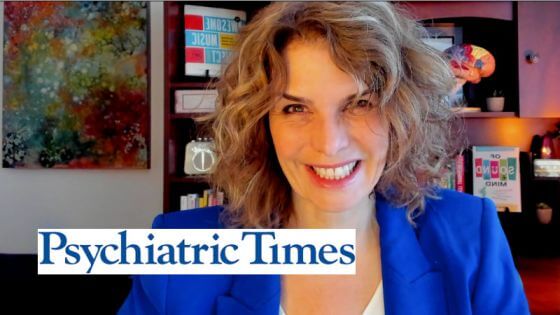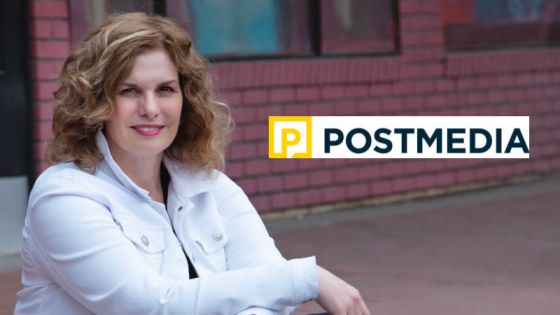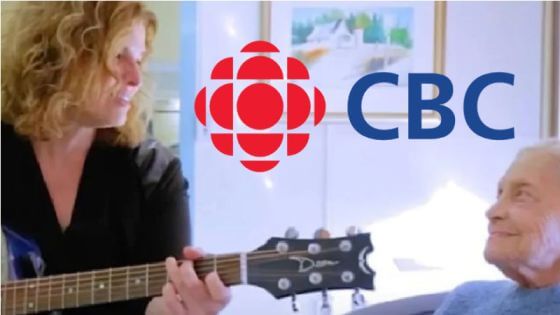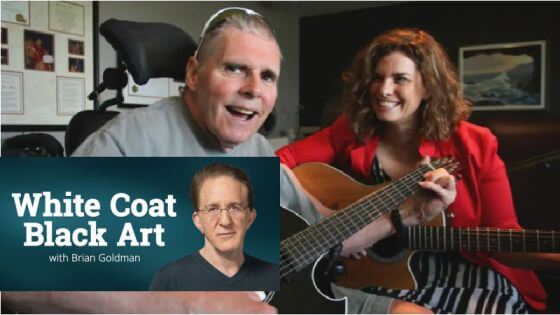When we experience the right music, in the right way, transformation can and does happen…one simple, yet powerful, note at a time. Described as an inspirational, uplifting, and highly engaging presentation, learn practical strategies, grounded in global research, that will foster improved mood, memory and motivation.
Mental health care is health care. This 2023, let us prioritize our mental health!
Every business begins with an origin story. Jennifer had the privilege to share ours with Steve Strauss, Senior Business Correspondence from USA Today for Zoho.
Music doesn’t get rid of every stress, but it can create space around our spirit, for a few hours or even for a few minutes, and help us connect to what is most meaningful in the moments we have been gifted.
It takes MANY ingredients to manage our mental health and I passionately believe MUSIC is one of them. Thank you for all the positive support around music for mental health and the power of a playlist. Here is just one interview over the last few months.
Creating a playlist can give vision to our auditory diet. Music can add meaning to moments…and in the case of #MyPlaylist2022 I hope it will support you the whole year through.



“When we use the right music at the right time in the right way, it can help us feel better, it can strengthen us, and it can make us able to feel improvement in the areas of mood, memory, and motivations.” In this Mental Health Minute video on Psychiatric Times, Jennifer Buchanan discusses the healing power of music and how music can help us start seeing our lives in technicolor.



Jennifer Buchanan, a Canadian music therapist and the author of “Tune In: A Music Therapy Approach to Life” said that music can stimulate many parts of the brain and intentional music learning is a key to psychological rehabilitation.
Parent Herald



At the heart of her new book, Wellness, Wellplayed: The Power of a Playlist, takes readers through the process of curating “purposeful playlists” to bring out certain emotions or to act as musical backdrops for performing various tasks or conjuring various memories.



Listening to music intentionally can go a long way to making you feel good. Sure, an algorithm can suggest a music playlist, but your streaming service isn’t intentionally curating lists to help you shake it up or seek out a peaceful, easy feeling.



This desire to order our music, especially during trying times, comes from a fundamental place. “COVID brought forth a way for us to curate what’s important to us and what we value,” she says. “The act of building a playlist can bring forth some new elements of what music means to you that you haven’t even considered yet. We all know music is very personal and we also know music can do things for us. It can give us that hug when we need it the most and the more personalized we can make the more meaningful it becomes.” – Jennifer Buchanan
Globe and Mail
Music helps us process life’s significant challenges and inevitable transitions. When words are not enough, let music start the conversation.
Music is one of the most efficient and effective ways to make a positive impact on all areas of your life. All cultures make music, and during times we feel our weakest we seek its power to connect, create and soothe. Music can be a communication bridge, one that can help you express and process your greatest life challenges, stressful transitions, and at times, an unexpected change in health.
The current respiratory and healthcare pandemic is leading to a Mental Health Pandemic. It is directly impacting Long-Term Care Facilities, Healthcare Workers, and Communities across Canada.
JB discusses music, music therapy and the importance of mental health. January 18th is considered by some to be a “blue day,” or the saddest day of the year. This year, with COVID, the day may be feeling heavier than even the most typical ‘blue day’
A partnership between The Awesome Music Project and the Canadian Music Therapy Fund ‘Songs For A Blue Day’ will share stories and songs about music’s incredible power to heal.



Finding your voice again after a stroke or a spinal cord injury can be a difficult journey, but Jennifer Buchanan’s company, JB Music Therapy, is helping patients even during COVID restrictions.
Jennifer continues to champion the profession of music therapy as a past-President of the Canadian Association of Music Therapists from 1998 – 2001 and 2013 – 2015 as their current Executive Director. Jennifer is a recipient of the two most prestigious Canadian music therapy lifetime service awards: the Frani Award and the Norma Sharpe Award.



Accompanying Lynn Lewis is music therapist Jennifer Buchanan on the guitar. The singing brings back joyful memories of singing and dancing with her mum. It’s what she needs to relax and lift her spirits in the dreary routine of her hospital stay.
CBC’s White Coat, Black Art
Music impacts brain function and human behavior reducing stress, pain and symptoms of depression as well as improving mood, memory and motivation. Jennifer has witness the power of these music connections with infants through to seniors, from the corporate boardroom to the palliative care unit, from the classroom to correction centre, and for people struggling with their mental health to those living with dementia. The results are nothing short of inspiring.



Jennifer Buchanan, a bright light in the ecosystem of innovative entrepreneurs in Alberta, served her first client in September of 1991. “Alberta seemed ready for something different to reach the needs of the people, with some luck on my side because music therapy was new, it really started taking off…I quickly transitioned from a private practice, to somebody that wanted to create more jobs for other music therapists. Today we are a team of 23”
Todayville



Calgary-based music therapist Jennifer Buchanan agrees that holiday music can irritate, but it can also do exactly what retailers hope it will: inspire us.
CTV News



Internationally known cellist Johanne Perron’s personal story rings true to Jennifer Buchanan, a leading expert on music therapy, “I’ve witnessed that when you find the right music at the right time in the right way, a client starts feeling the desired state they want to feel, less anxious, less stressed, and more creative.
UToday – University of Calgary



Jennifer Buchanan is a music therapist who believes that music can be used to fight everything from stress to loss of speech after a stroke. Since listening to music can activate many parts of the brain, it can serve many different functions, she said. For psychological rehabilitation, for example, Buchanan believes that “intentional music listening” is key.
Fox News
It was an honour to be interviewed by the wonderful Wes Funk prior to his death (February 18, 1969 – October 9, 2015). He published several novels and hosted the weekly television series, Lit Happens on Shaw TV.



While optimistic about iPods and other devices that allow music to be so portable, Buchanan is a big believer in the quality of sound, acting as a spokesperson for Marantz, the high-end speaker systems that “feel live, exactly the way the music and artist intended,” as well as Future Shop, where they’re sold. She emphasizes the importance of taking the time to sit and really listen to music, instead of just using it as background noise.
Huffington Post



Calgary music therapist Jennifer Buchanan says if there is a typical time in your day you feel stressed, try listening to calming music that puts you in a better place, just before that time. “But what can be really beneficial for our health is to have a playlist that is defined that is actually labeled by the emotional state you hope to achieve.”
Global News
Think back to the last song they played at your school dance, that mixtape your school sweetheart made for you, or the song that reminds you of summer. Behind every song is an untold story, and when you pull those powerful songs together, it can be transformational. Now imagine you were no longer able to speak. When words are not enough, music can start the conversation.
If you are a professional in the corporate, government or healthcare sector seeking innovative ways to enhance your environment and improve productivity, this presentation will be a revelation. Request the improvised song at the end that will anchor your conference’s theme and key takeaways – and prepare for an enlightening shift as the entire audience explores music’s profound potential to impact work and overall well-being.
Mental health care is health care. This 2023, let us prioritize our mental health!
Every business begins with an origin story. Jennifer had the privilege to share ours with Steve Strauss, Senior Business Correspondence from USA Today for Zoho.
Music doesn’t get rid of every stress, but it can create space around our spirit, for a few hours or even for a few minutes, and help us connect to what is most meaningful in the moments we have been gifted.
It takes MANY ingredients to manage our mental health and I passionately believe MUSIC is one of them. Thank you for all the positive support around music for mental health and the power of a playlist. Here is just one interview over the last few months.
Creating a playlist can give vision to our auditory diet. Music can add meaning to moments…and in the case of #MyPlaylist2022 I hope it will support you the whole year through.



“When we use the right music at the right time in the right way, it can help us feel better, it can strengthen us, and it can make us able to feel improvement in the areas of mood, memory, and motivations.” In this Mental Health Minute video on Psychiatric Times, Jennifer Buchanan discusses the healing power of music and how music can help us start seeing our lives in technicolor.
Jennifer Buchanan, a Canadian music therapist and the author of “Tune In: A Music Therapy Approach to Life” said that music can stimulate many parts of the brain and intentional music learning is a key to psychological rehabilitation.
Parent Herald






At the heart of her new book, Wellness, Wellplayed: The Power of a Playlist, takes readers through the process of curating “purposeful playlists” to bring out certain emotions or to act as musical backdrops for performing various tasks or conjuring various memories.
Listening to music intentionally can go a long way to making you feel good. Sure, an algorithm can suggest a music playlist, but your streaming service isn’t intentionally curating lists to help you shake it up or seek out a peaceful, easy feeling.






This desire to order our music, especially during trying times, comes from a fundamental place. “COVID brought forth a way for us to curate what’s important to us and what we value,” she says. “The act of building a playlist can bring forth some new elements of what music means to you that you haven’t even considered yet. We all know music is very personal and we also know music can do things for us. It can give us that hug when we need it the most and the more personalized we can make the more meaningful it becomes.” – Jennifer Buchanan
Globe and Mail
Music helps us process life’s significant challenges and inevitable transitions. When words are not enough, let music start the conversation.
Music is one of the most efficient and effective ways to make a positive impact on all areas of your life. All cultures make music, and during times we feel our weakest we seek its power to connect, create and soothe. Music can be a communication bridge, one that can help you express and process your greatest life challenges, stressful transitions, and at times, an unexpected change in health.
The current respiratory and healthcare pandemic is leading to a Mental Health Pandemic. It is directly impacting Long-Term Care Facilities, Healthcare Workers, and Communities across Canada.
JB discusses music, music therapy and the importance of mental health. January 18th is considered by some to be a “blue day,” or the saddest day of the year. This year, with COVID, the day may be feeling heavier than even the most typical ‘blue day’
A partnership between The Awesome Music Project and the Canadian Music Therapy Fund ‘Songs For A Blue Day’ will share stories and songs about music’s incredible power to heal.
Finding your voice again after a stroke or a spinal cord injury can be a difficult journey, but Jennifer Buchanan’s company, JB Music Therapy, is helping patients even during COVID restrictions.



Jennifer continues to champion the profession of music therapy as a past-President of the Canadian Association of Music Therapists from 1998 – 2001 and 2013 – 2015 as their current Executive Director. Jennifer is a recipient of the two most prestigious Canadian music therapy lifetime service awards: the Frani Award and the Norma Sharpe Award.
Accompanying Lynn Lewis is music therapist Jennifer Buchanan on the guitar. The singing brings back joyful memories of singing and dancing with her mum. It’s what she needs to relax and lift her spirits in the dreary routine of her hospital stay.
CBC’s White Coat, Black Art



Music impacts brain function and human behavior reducing stress, pain and symptoms of depression as well as improving mood, memory and motivation. Jennifer has witness the power of these music connections with infants through to seniors, from the corporate boardroom to the palliative care unit, from the classroom to correction centre, and for people struggling with their mental health to those living with dementia. The results are nothing short of inspiring.
Jennifer Buchanan, a bright light in the ecosystem of innovative entrepreneurs in Alberta, served her first client in September of 1991. “Alberta seemed ready for something different to reach the needs of the people, with some luck on my side because music therapy was new, it really started taking off…I quickly transitioned from a private practice, to somebody that wanted to create more jobs for other music therapists. Today we are a team of 23”
Todayville






Calgary-based music therapist Jennifer Buchanan agrees that holiday music can irritate, but it can also do exactly what retailers hope it will: inspire us.
CTV News
Internationally known cellist Johanne Perron’s personal story rings true to Jennifer Buchanan, a leading expert on music therapy, “I’ve witnessed that when you find the right music at the right time in the right way, a client starts feeling the desired state they want to feel, less anxious, less stressed, and more creative.
UToday – University of Calgary






Jennifer Buchanan is a music therapist who believes that music can be used to fight everything from stress to loss of speech after a stroke. Since listening to music can activate many parts of the brain, it can serve many different functions, she said. For psychological rehabilitation, for example, Buchanan believes that “intentional music listening” is key.
Fox News
It was an honour to be interviewed by the wonderful Wes Funk prior to his death (February 18, 1969 – October 9, 2015). He published several novels and hosted the weekly television series, Lit Happens on Shaw TV.



While optimistic about iPods and other devices that allow music to be so portable, Buchanan is a big believer in the quality of sound, acting as a spokesperson for Marantz, the high-end speaker systems that “feel live, exactly the way the music and artist intended,” as well as Future Shop, where they’re sold. She emphasizes the importance of taking the time to sit and really listen to music, instead of just using it as background noise.
Huffington Post
Calgary music therapist Jennifer Buchanan says if there is a typical time in your day you feel stressed, try listening to calming music that puts you in a better place, just before that time. “But what can be really beneficial for our health is to have a playlist that is defined that is actually labeled by the emotional state you hope to achieve.”
Global News



Think back to the last song they played at your school dance, that mixtape your school sweetheart made for you, or the song that reminds you of summer. Behind every song is an untold story, and when you pull those powerful songs together, it can be transformational. Now imagine you were no longer able to speak. When words are not enough, music can start the conversation.